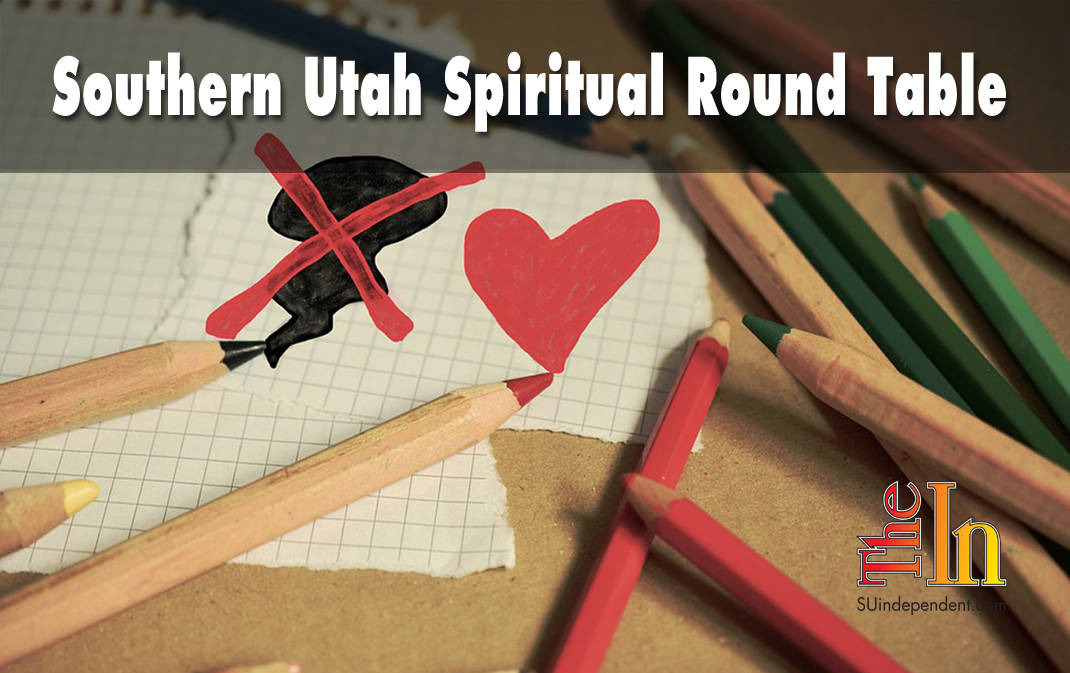 The concept of the Southern Utah Spiritual Round Table is to present answers to a challenging spiritual question from a group of four southern Utah spiritual leaders from the Interfaith Counsel. That way, you get multiple perspectives and potential answers to mull over in regards to the question of the week.
The concept of the Southern Utah Spiritual Round Table is to present answers to a challenging spiritual question from a group of four southern Utah spiritual leaders from the Interfaith Counsel. That way, you get multiple perspectives and potential answers to mull over in regards to the question of the week.
This week’s question is “Should I forgive someone who has repeatedly hurt me, and if so, how?”
From Unity Center of Positive Living spiritual leader Carmella Fitzpatrick
This is a difficult one, because it sounds like your heart is really tied up in this one. I’m going to assume that this person knows that they are hurting you because you have already forgiven them. It also sounds like they expect you to continue to forgive them because you do love them.
Obviously, though, they don’t feel like they have to change … all they have to do is say, “I’m sorry, will you forgive me?” knowing full well how you feel for them.
This kind of person will try to make you stay only because it makes them more comfortable, not because they are going to change. You’ll have to be strong. Ask God to give you strength. He will, for God loves you more than you know at this point and never wants you to hurt. You just need to forgive them one last time and go your separate ways.
It can be very challenging to forgive someone who has hurt you. However, being able to truly forgive a person for hurting you can help you to feel better. Forgiving someone for hurting you has been shown to relieve stress, so you’ll be doing yourself a favor in the process. Learning to forgive someone can be a long and intensive process. None of us are perfect, though, and that is why in the Lord’s Prayer it is said to “forgive, as you would be forgiven.” So in your parting ways, remember that.
Mostly, though, it is written in Proverbs 4:23, “Above all else, guard your heart, for everything you do flows from it.” So protect yourself, and move on.
From Southern Utah Community of Christ lay leader Nancy Ross
Often, people demand that we forgive them or forgive others immediately in order to return relationships back to how they were before the offense. This is often to make the offender feel better with little regard for how the victim feels. Forgiveness can take time, and for some, offenses may take our whole lives to forgive, and still it may never happen. I’m not sure that we should force forgiveness, nor should we nurture a grudge. I also think that it is important to separate forgiveness and repairing a relationship. When someone has hurt me, I may want to let go of that hurt through forgiveness, but I am not required to trust that person again. It is not a victim’s job to make a bad situation right or to trust again where trust has been broken. I have had to let go of some relationships where it has not been possible to repair trust.
From Mike Kruse, Unitarian Universalist Fellowship of Southwestern Utah
Forgiveness is one of the most important qualities and actions we can make. No one wants to be hurt by word or deed, but everyone is because everyone is not perfect. I am reminded of what Jesus said when being crucified: “Father, forgive them for they know not what they do.”
Another aspect is to understand why people hurt others. Usually they are fearful, confused, or misunderstood. We should take the time to listen and try to not “read between the lines” but “listen despite the anger.” This is not easy, but with practice, it can be done.
It is also important to forgive because it is better for our own body, soul, and spirit. Science and religion both have taught us that we can become depressed, angry, or hateful or lash out when we are hurt by others. Doctors have said that many diseases are either caused or worsened by depression. We have all done this, but we need to learn not only to forgive others, but forgive ourselves. Through prayer, yoga, and meditation, we can learn to be more forgiving, loving, and compassionate.
The Dalai Lama stated that no one wants to get angry, and few want to deliberately hurt others. So, he says, we must remember to separate the statements people say from the great qualities of the person or distinguish between the act and the actor.
Mark Twain said, “Forgiveness is the fragrance the violet sheds on the heel that has crushed it”.
Never forget the words of Alexander Pope: “To err is human, to forgive divine.
From Free Spirit Community spiritual leader Cynthia Cashin
That is an excellent question, and one that has very likely affected most of us in our lives.
Yes, forgiveness is the way to go. Forgiving the other person does not mean we excuse or condone the behavior that we believe has injured us, nor are we doing it for that person’s benefit. We always forgive for ourselves to set ourselves free from the spiritual, emotional, and psychological harm that we do to ourselves when we hold on to anger, resentment, and vengeance.
That negative energy takes its toll on us and on those around us and if painful and prolonged enough can even result in physical illness. That is powerful motivation for us to forgive, and when coupled with acceptance and compassion that the person is in reality doing the best they can from where they are in terms of their spiritual evolution, the practice of forgiveness becomes easier.
It is important for us to realize that although it is essential for our own well-being that we practice forgiveness on an ongoing basis, it is equally important that we not be in denial about the other person’s repetitive behavior and that we do not forget it. In the wise words of Maya Angelou, “When someone shows you who they are, believe them the first time.” We teach people how to treat us. We may wish to strongly consider setting firm boundaries with someone who repeatedly behaves in unloving ways toward us, including completely separating from them, but from a place of love, not anger.
Lastly but perhaps most importantly, we will want to look at the state of our own self-love. Why did we attract this person or experience into our lives? Where are we not loving ourselves enough to allow and tolerate inconsiderate and unloving behavior by someone close to us? Engage in spiritual practices of self-care, self-love, and self-forgiveness. The more deeply and truly we love ourselves, the less and less we will attract these negative experiences, and the more we will attract those people and experiences into our lives that reflect the love and respect we have for ourselves.



